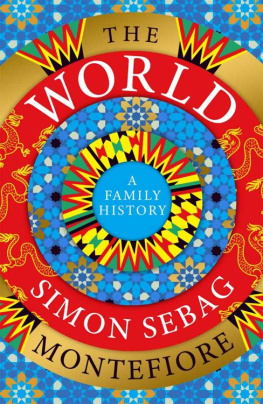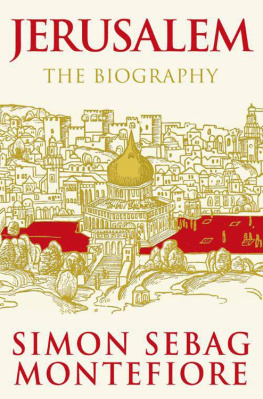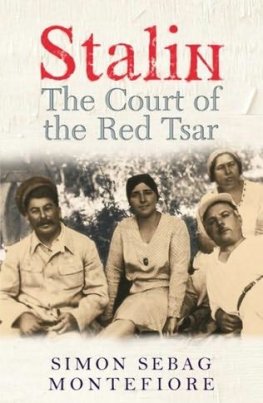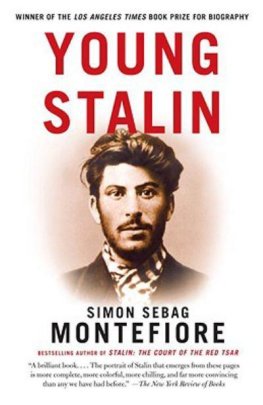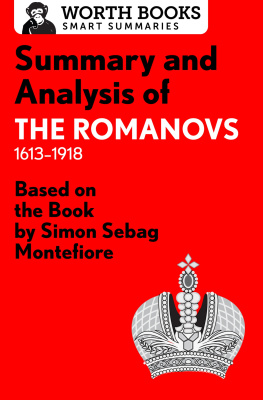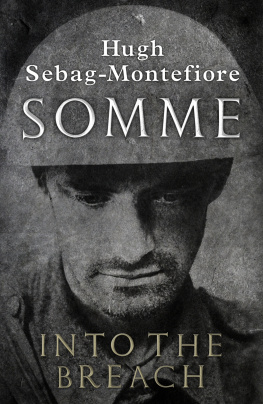Simon Sebag Montefiore - The World
Here you can read online Simon Sebag Montefiore - The World full text of the book (entire story) in english for free. Download pdf and epub, get meaning, cover and reviews about this ebook. year: 2022, publisher: Orion, genre: Home and family. Description of the work, (preface) as well as reviews are available. Best literature library LitArk.com created for fans of good reading and offers a wide selection of genres:
Romance novel
Science fiction
Adventure
Detective
Science
History
Home and family
Prose
Art
Politics
Computer
Non-fiction
Religion
Business
Children
Humor
Choose a favorite category and find really read worthwhile books. Enjoy immersion in the world of imagination, feel the emotions of the characters or learn something new for yourself, make an fascinating discovery.
- Book:The World
- Author:
- Publisher:Orion
- Genre:
- Year:2022
- Rating:5 / 5
- Favourites:Add to favourites
- Your mark:
- 100
- 1
- 2
- 3
- 4
- 5
The World: summary, description and annotation
We offer to read an annotation, description, summary or preface (depends on what the author of the book "The World" wrote himself). If you haven't found the necessary information about the book — write in the comments, we will try to find it.
Simon Sebag Montefiore: author's other books
Who wrote The World? Find out the surname, the name of the author of the book and a list of all author's works by series.
The World — read online for free the complete book (whole text) full work
Below is the text of the book, divided by pages. System saving the place of the last page read, allows you to conveniently read the book "The World" online for free, without having to search again every time where you left off. Put a bookmark, and you can go to the page where you finished reading at any time.
Font size:
Interval:
Bookmark:
TO MY DARLING SON,
SASHA
In memory of my parents,
Stephen & April

CONTENTS
If a kingdom be a great family, a family likewise is a little kingdom, torn with factions and exposed to revolutions. Samuel Johnson The world is a mountain and our deeds, voices; The voices have echoes; to us they will return. Rumi Until the lions have their own historians, the history of the hunt will always glorify the hunter. Chinua Achebe Truth never yet fell dead in the streets; it has such an affinity with the soul of man, the seed however broadcast will catch somewhere and produce its hundredfold. Theodore Parker So many wars, so many shapes of crime... Unholy Mars bends all to his mad will; The world is like a chariot run wild. Virgil The whole question is: who controls whom. Lenin He who believes that by studying isolated histories, he can acquire a fairly just view of history as a whole, is like the person who, after looking at the severed limbs of an animal once alive and beautiful, fancies he has seen the creature alive in all its action and grace... It is only indeed by study of the interconnection of all the particulars, their resemblances and differences, that we are enabled at least to make a general survey, and thus derive both benefit and pleasure from history. Polybius Midway on lifes journey, I found myself in a dark wood, for the straight path was lost. Dante AlighieriThis is a world history that I wrote during the menacing times of Covid lockdown and Russian invasion of Ukraine. There are a million ways to do such a thing; hundreds of historians, starting in ancient times, have done it their way; most universities now have professors of world history and scores of such works are published annually, many of them brilliant, and I have tried to read them all. No book is easy to write, world history harder than most. Words and ideas pour out of my head, wrote Ibn Khaldun composing his world history, like cream into a churn. There has been much cream and much churning in the writing of this.
I have always wanted to write an intimate, human history like this, in some ways a new approach, in some ways a traditional one, which is the fruit of a lifetime of study and travels. I have been lucky enough to visit many of the places in this history, to witness wars and coups that play a part in it, and to have conversations with a few characters who have played roles on the world stage.
When I was eleven, my father, a thoughtful medical doctor, gave me an abridged version of the now pungently unfashionable Arnold Toynbees A Study of History . Maybe one day, he said, youll write something like this, and I spent hours reading histories of places and times that were not taught at my English school, where study of the Tudors and Nazis dominated.
This book has given me the greatest satisfaction of my writing life, and presented the most daunting challenge. But I have suffered much less than many other historians. Ibn Khaldun saw both his parents perish of the plague. Sir Walter Raleigh wrote his History of the World while waiting to be executed, a condition that surely fostered the required perspective. But he was beheaded before finishing (an unbearable thought). History has a special, almost mystic power to shape (and, if abused, to distort) the present: thats what makes history-writing an essential and noble but dangerous profession. Sima Qian, the Chinese world historian (born circa 145 BC ), was accused of defaming the emperor and given a choice between execution and becoming a palace eunuch. He opted for castration so that he could complete his history: before I had finished my rough manuscript, I met with this calamity If it may be handed down to men who will appreciate it, and penetrate to the villages and great cities, then though I should suffer a thousand mutilations, what regret should I have? Every historian, every writer shares that dream. Sima Qian was in my thoughts as I wrote
Among living historians, a galaxy of distinguished, brilliant scholars have read, discussed and corrected all or part of this book: thank you to Dominic Lieven, Professor of International History, LSE; Peter Frankopan, Professor of Global History, Oxford; Olivette Otele, Professor of the Legacies and Memory of Slavery, SOAS; Thomas Levenson, Professor of Science Writing, MIT; Sir Simon Schama, Professor of History and Art History, Columbia Univeristy; David Abulafia, Professor Emeritus of Mediterranean History, Cambridge University; Abigail Green, Professor of Modern European History, Oxford.
Dr Henry Kissinger, US Secretary of State 19737, read his period; I had the honour to talk about the creation of the internet with Sir Tim Berners-Lee and Rosemary Berners-Lee. Thanks to Ben Okri.
Thanks to the following for correcting these specific subjects:
Africa: Luke Pepera.
Americas: (USA) Annette Gordon-Reed, Charles Warren Professor of American Legal History, Harvard Law School; Andrew Preston, Professor of American History, Cambridge University; (Mesoamerica/South America) Matthew Restall, Edwin Erle Sparks Professor of Colonial Latin American History, Penn State College of Liberal Arts; (Brazil) Lilia Schwarcz, Professor of Anthropology, University of So Paulo.
China: (early) Michael Nylan, Professor, East Asian Studies, Berkeley University; (Qin onwards) Mark C. Elliott, Mark Schwartz Professor of Chinese and Inner Asian History, Harvard University.
Genetics/DNA: Dr Adam Rutherford.
Greeks: Roderick Beaton, Emeritus Koraes Professor of Modern Greek & Byzantine History, Kings College, London.
India/South Asia: Tirthankar Roy, Professor in Economic History, LSE; Dr Tripurdaman Singh, Institute of Commonwealth Studies, School of Advanced Studies, London University; William Dalrymple; Dr Sushma Jansari, Curator, South Asia Collections, British Museum; Dr Imma Ramos, Curator, South Asia Collections, British Museum; Dr Katherine Schofield, Senior Lecturer in South Asian Music and History, Kings College London.
Iran: Lloyd Llewellyn-Jones, Professor in Ancient History, Cardiff University.
Japan: Dr Christopher Harding, Senior Lecturer, Asian History, Edinburgh University.
Ukraine: Serhii Plokhy, Mykhailo Hrushevsky Professor of Ukrainian History, Harvard University
My thanks to the following for their corrections in subjects presented chronologically:
Prehistory: Professor Chris Stringer, Research Leader, Human Evolution, Natural History Museum; (Sumeria/Mesopotamia) Augusta McMahon, Professor of Mesopotamian Archaeology, Cambridge; Dr John MacGinnis, Department of Middle East, British Museum.
Ancient Egypt: Salima Ikhram, Professor of Egyptology, American University in Cairo.
Ancient Rome: Greg Woolf, Ronald J. Mellor Chair of Ancient History at University of California.
Silk Roads: Peter Frankopan.
Byzantium: Jonathan Harris, Professor of the History of Byzantium, Royal Holloway, University of London; Peter Frankopan.
Vikings: Neil Price, Professor of Archaeology, University of Uppsala.
Kyivan Rus/Muscovy: Dr Sergei Bogatyrev, Associate Professor, University College London (author of a forthcoming book on familial memory in Kyivan Rus).
Medieval Europe/Normans: Robert Bartlett, Emeritus Professor, St Andrews University.
Mongols: Timothy May, Professor of Central Eurasian History, University of North Georgia.
Incas and Aztecs: Matthew Restall, Edwin Erle Sparks Professor of Colonial Latin American History, Penn State College of Liberal Arts.
Ethiopia: Dr Mai Musi, postdoctoral researcher in Race and Ethnicity in the ancient Graeco-Roman world, Oxford University; Dr Verena Krebs, Ruhr-University Bochum; Dr Adam Simmons, Nottingham Trent University; Dr Bar Kribus, Hebrew University, Jerusalem.
Next pageFont size:
Interval:
Bookmark:
Similar books «The World»
Look at similar books to The World. We have selected literature similar in name and meaning in the hope of providing readers with more options to find new, interesting, not yet read works.
Discussion, reviews of the book The World and just readers' own opinions. Leave your comments, write what you think about the work, its meaning or the main characters. Specify what exactly you liked and what you didn't like, and why you think so.

